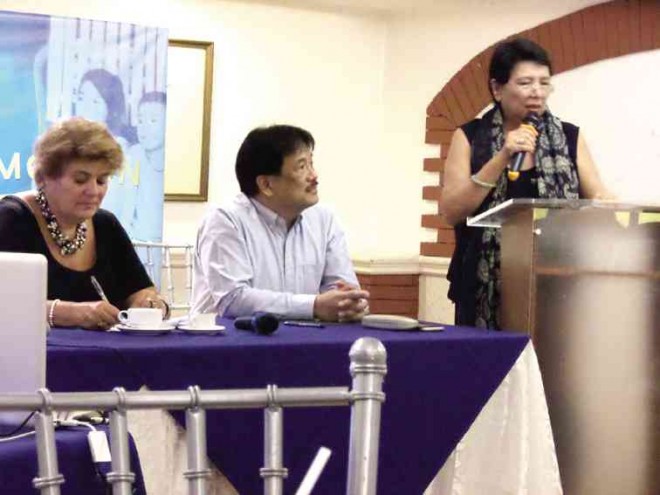The University of the Philippines Open University (UPOU) has started offering eight free massive open online courses (MOOCs) on child protection and promotion.
As the term suggests, MOOCs will allow large numbers of users, even in the thousands, to access the programs.
Courses on Legal Instruments for the Protection of Children, Traditional and New Media for Child’s Rights Protection and Promotion and Planning Programs on Child Rights Protection and Promotion will be conducted from Sept. 26 to Nov. 6.
Ongoing right now are courses on Understanding Better the Child and Communicating for Child Protection and Promotion: Theoretical Approaches. The programs, which began on Aug. 15, will end on Sept. 25.
UPOU partnered with the United Nations Children’s Fund (Unicef) to develop the courses that will be offered until mid-December. Courses are open to everyone, especially to those directly involved in conceptualizing, developing and implementing programs on children and those advocating for the protection and promotion of their rights.
Each course, which will run from four to six weeks, will be delivered in multimedia format—video, text and podcast.
In a press conference, Dr. Grace Javier-Alfonso, UPOU chancellor, said the online programs were part of efforts to promote “a culture of caring for children.”
She said, “Protecting children and promoting their rights should be a collective effort.” She stressed the need for coordinated and massive capability building efforts.
Lotta Sylwander, Unicef country representative in the Philippines, said “there is a lot of misunderstanding about child protection and children’s rights and why they need to be protected,” as she underscored the need for the educational programs.
Javier-Alfonso said the courses were available in English and Filipino “to remove the language barriers.” UPOU dean Melinda de la Peña Bandalaria of the Faculty of Information and Communication Studies said the courses could be translated later into other major Philippine languages.
But Bandalaria said that although the courses were open and free, those who wanted to take them would still have to register so their activities could be tracked and their achievement assessed later. Javier-
Alfonso said those who finished the nonformal education programs would receive certificates of completion.
Augusto Rodriguez, chief of Unicef Philippines social policy section, said the programs’ initial focus would be on implementers of child protection and promotion laws and regulations. Later, the participation of other stakeholders, parents and even children will be sought.
Bandalaria acknowledged that lack of Internet connection could limit the programs’ reach. Rodriguez said most of the potential target audience did not even really know how to use online courses.
“One of the challenges … in offering MOOCs is the digital divide or lack of access of some sectors/groups…. This [is] why sectors (targeted by MOOCs) are not enrolled … and why most MOOC learners are those who already have college or higher education and those who are working. The UPOU MOOCs will try to address this concern by involving Community eCenters (CeCs) … [that] are public access points for computers and the Internet. These are usually established and managed by local government units [so] in most cases, services are … free.”
As for lack of knowledge on the use of the Internet, which Rodriguez mentioned, Bandalaria said CeCs, which are usually maintained and operated by local governments, provide digital literacy training to community members so they could try to raise their literacy levels, find jobs, learn entrepreneurship, etc.
In most cases, Bandalaria said, services are free although some CeCs charge fees for select services to support sustained operations.
Bandalaria said that so far, about 1,400 CeCs have been established—one for each of the country’s 1,400 municipalities. Some local governments have set up CeCs to provide Internet access at the barangay level.
Bandalaria said that in areas with CeCs, UPOU would use the centers to bring the MOOCs on child protection to target audiences. At least 11 CeCs had, so far, expressed interest to be part of the project, she said. CeC managers were tasked to disseminate the information and campaign for enrollment in the courses, she said.
Public service university
Javier-Alfonso said UPOU was helping in the coordinated and massive capability building efforts to push child rights promotion and protection through MOOCs as an educational institution and a public service university.
UPOU’s MOOCs aim “to develop an institutionalized and sustainable mechanism of capacity building focused on child rights protection and promotion and scale up the process of creating a bigger impact on child rights protection at the community level.”
Courses are clustered under three major concerns: Theoretical, Legal and Strategic Foundations for Child Rights Protection and Promotion (three courses); Planning and Implementing Programs for Child Rights Protection and Promotion (two courses); and Communicating and Advocating for Child Rights Protection (three courses).
From Nov. 7 to Dec. 18, UPOU will offer Institutional Mechanisms toward Child Rights Protection and Promotion, Implementing Child Rights Programs and Advocacy and Social Mobilization for Child Rights Protection and Promotion.
Those who complete the eight courses may enroll in the Special Project on Child Rights Protection and Promotion to be offered between January and March.
To sign up for the courses, log on to model.upou.edu.ph. For inquiries, e-mail mbandalaria@upou.edu.ph.a Text and photo by Linda B. Bolido
